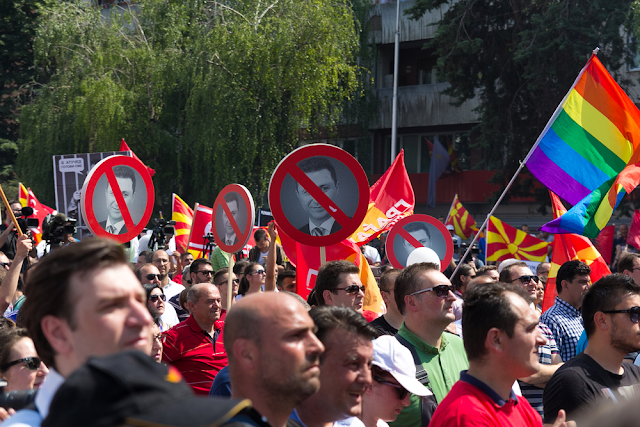Not participating in the national elections in June is a strong and radical decision: what brought DOM to such a choice?
DOM cannot participate in elections that will not lead towards a solution of the political crisis in Macedonia, but may deepen it even more. The solution for the crisis may start with fair, free and democratic elections, but we still do not have the main prerequisites for them: a credible electoral list, media regulations and a division between parties and the state. All three points are part of the political agreement of the 4 biggest parties with mediation of the international community last year. This agreement came after a scandal with illegal wiretappings where many politicians were involved in breaking the laws. If the elections on the June 5 will be held in this way, it means that the ruling parties may again misuse the so- called "phantom" voters, that the citizens could see personally through the e-application on the website of the State Electoral Commission.
In your electoral program, what are the concrete steps you're proposing against corruption and public mismanagement which is affecting the Macedonian institutions?
We propose more transparent processes of budgeting and spending controls on a national and local level; professional and independent institutions, that means employment and upgrading of the civil servants according a meritocratic system; the change of many laws concerning public calls, where we formally have a solid framework for fair competition of different offers, but as we could here from the wiretappings, the procedures have been in total control of the ruling party; including more substantial criteria for public calls, especially the experience and capacity of the companies, quality of the delivered products and obligation to be environmentally friendly; decent salaries for employees in public administration etc.
Is the opposition front united against the current government? What role does DOM play in this front?
The opposition front is growing each day with parties, civil organizations and movements. At the moment there are three groups: the biggest is the Platform for democratic Macedonia with 18 parties, initiated by SDSM – social-democrats, with leftist, centric and rightist parties from different ethnic backgrounds; a smaller centric-right group of two parties and two civic organizations; and the Albanian opposition block of four parties. DOM joined the Platform on the 14th April, which was a logical step after one year of open fighting against the authoritarian way the country was guided, as well as the crime and corruption detected in the "bombs". This Platform is fighting to reach conditions for fair and democratic elections and is not just a coalition for elections. DOM is very active and visible in in the public eye with statements, interviews and protests.
Why does the President's decision to pardon politicians who are facing crime probes come at this very delicate moment? What is the government trying to achieve with this?
This scandalous President's decision came at the moment when the elections had to be formally declared by the President of the Parliament, while the citizens were already protesting on the streets, asking for a delay until the electoral list would be purified from "phantom" voters. His decision for pardoning the politicians with serious indications for crime and corruption coincided with some new processes prepared by the Special Public Prosecutor, where some very high officials were mentioned. So, it was obvious that the President was saving them, breaking the rule of law and the principles of justice, by announcing that the politicians are protected species, different from all other citizens, and that they can continue doing the same things in the future without punishment. This caused an explosion of protests first in Skopje and later in the whole country. These were the demands: a withdrawal of the pardoning, the resignation of the President and the Government, a technical Government that will prepare democratic elections within one year and a Special Court that will proceed the cases by the Special Public Prosecutor. The slogan is: No justice, no peace!
What impact will the internal crisis in Macedonia have on the national and regional capacity of Macedonia to help refugees and to support European actions which aim to tackle the refugee crisis? How is DOM reacting to what is happening in Idomeni?
Most of the attention of the public is turned towards the internal political crisis, while the institutions are trying to fulfill their obligations towards the refugee crisis, according to demands of the EU. Here, there are some confusing contradictions in these demands, keeping in mind international humanitarian law, on which we reacted several times as a party. We repeated the appeal for better conditions for refugees and the necessity of solidary cooperation between two neighboring countries, for the sake of the refugees in Idomeni and for the stability of the region. We also saluted the Balkan conference on migrants and refugees in Greece announced for these days.

